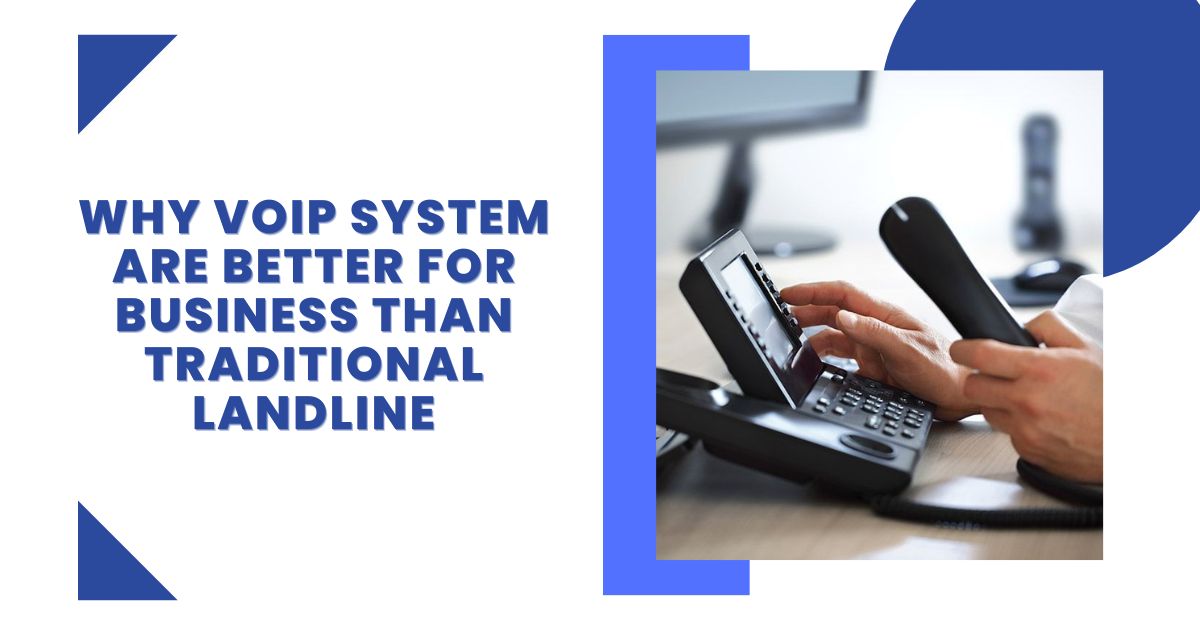In the realm of business communication, the decision between Voice over Internet Protocol (VoIP) and traditional landline systems has become a pivotal choice for organizations worldwide. With technological advancements transforming the landscape of connectivity, many businesses are opting for VoIP over conventional landlines. Let’s delve into the compelling reasons why VoIP stands out as the superior choice for businesses in the modern era.
Cost-Effectiveness:
One of the most appealing aspects of VoIP for businesses is its cost-effectiveness. Traditional landlines often come with higher setup costs, expensive hardware, and additional charges for long-distance or international calls. In contrast, VoIP operates over the internet, eliminating the need for costly infrastructure and utilizing existing network connections. Businesses can significantly reduce their communication expenses with VoIP, especially for long-distance and international calls, as these are often included in flat-rate plans or available at lower rates compared to landline services.

Scalability and Flexibility:
Scalability is crucial for growing businesses, and VoIP system offer unparalleled flexibility in this aspect. Unlike landlines that require physical phone lines for each extension, VoIP allows for easy scalability without the need for additional hardware. Adding new lines or extensions in VoIP is a simple and swift process, making it ideal for businesses experiencing growth or those with fluctuating communication needs. Moreover, VoIP services often include features like voicemail to email, call forwarding, and virtual phone numbers, enabling seamless communication management from anywhere, fostering flexibility in remote work setups.
Advanced Features and Functionality:
VoIP system offer a wide array of advanced features and functionalities that surpass the capabilities of traditional landlines. Features such as auto-attendant, call routing, call recording, video conferencing, and integration with other business applications are inherent to VoIP platforms. These features enhance productivity, streamline communication, and enable businesses to deliver a superior customer experience. Additionally, VoIP technology continues to evolve, with providers regularly introducing new features and updates, ensuring businesses stay at the forefront of communication innovation.
Mobility and Accessibility:
In an increasingly mobile-centric world, the ability to stay connected regardless of location is paramount for business operations. VoIP system empower employees to make and receive calls using their business numbers from anywhere with an internet connection. Whether working remotely, traveling, or conducting business on the go, VoIP enables seamless communication through mobile apps or softphone applications. This level of mobility and accessibility ensures uninterrupted connectivity, boosting productivity and responsiveness.
Reliability and Redundancy:
Contrary to common misconceptions, VoIP system offer reliability comparable and in many cases better than traditional landlines. VoIP providers often implement redundant systems and failover protocols to ensure uninterrupted service in case of internet outages or system failures. With proper configuration and backup solutions in place, VoIP can be as reliable as landline systems, if not more so. Additionally, advancements in internet infrastructure and network stability have significantly improved the reliability of VoIP services over the years.
Environmental Impact:
VoIP aligns with sustainability initiatives due to its minimal hardware requirements and reduced energy consumption compared to traditional landlines. By leveraging the existing internet infrastructure, VoIP contributes to a smaller carbon footprint by eliminating the need for extensive physical phone lines and hardware. This eco-friendly approach resonates with businesses aiming to adopt environmentally conscious practices and reduce their overall environmental impact.
In summary, the advantages of VoIP for businesses are abundant, ranging from cost-effectiveness and scalability to advanced features, mobility, and environmental sustainability. While traditional landlines have served as the cornerstone of communication for decades, VoIP stands as the frontrunner in modern business telecommunications. Embracing VoIP technology equips businesses with the tools and flexibility needed to thrive in today’s dynamic and interconnected business landscape, providing a competitive edge and elevating the overall efficiency and effectiveness of communication strategies.





Leave a reply